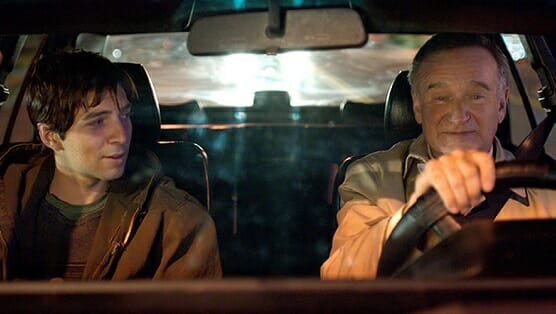Boulevard

A world premiere at the 2014 Tribeca Film Festival, director Dito Montiel’s Boulevard now bears the unfortunate distinction of being the last live-action release of Robin Williams’ career. As wildly gifted of a comedian as Williams was, the roster of down-tempo movies in which he indulged a melancholy and wounded disposition is remarkably deep. And while this intimately scaled drama doesn’t touch the same heights of Good Will Hunting or exhibit quite the same sort of layered filmmaking technique present in Insomnia or One Hour Photo, Boulevard is nonetheless a fitting final film for Williams—flawed but confirming of the breadth of his talents.
The film centers around Nolan (Williams), a bank loan officer who lives a sleepy suburban existence with his wife Joy (Kathy Baker). After more than two-and-a-half decades at the same branch, he’s up for a promotion, but doesn’t seem too enthusiastic about it—not even bothering to share the information with Joy before his friend Winston (Bob Odenkirk) lets it casually slip at a dinner party. One evening, during an aimless drive down a street in a rundown part of town, Nolan takes notice of and pity on Leo (Roberto Aguire), a young kid who turns out to be a prostitute, hustling tricks to both pay for his rent and keep a pimp at bay.
Nolan, it turns out, is a closeted gay man, but his interest in Leo is something slightly more than libidinal; he doesn’t pay him for straight sex, but simply to spend time together, and sometimes admire his lean, youthful body. Nolan’s instincts to help, however, are eventually complicated by some of the other problems Leo faces, leading Nolan to a reckoning about the trajectory of his own life.
In films like A Guide to Recognizing Your Saints, Fighting and The Son of No One, Montiel has shown an affinity for working-class characters. Here, working from a script by Douglas Soesbe, Montiel reaches for a character far removed from the streets, to contrast with a scruffy wayward one who could easily populate the fringe of one of his other films.
Somewhat admirably, Boulevard doesn’t over-sketch its characters by loading up interactions with a lot of expository dialogue. But the flip side of this is there’s not much depth to Nolan and Joy’s relationship. Since viewers don’t know how the pair met or much about their shared lives, we don’t get a firm sense of the history that has kept them together. When they fight and Joy plaintively says, “I don’t want to live in the real world, that’s why I married you!” it’s a moment that might connect with more of an emotional punch if only viewers knew more about her life and interests—or even what Joy and Nolan share other than a mailing address and a couple friends.
-

-

-

-

-

-

-

-

-

-

-

-

-

-

-

-

-

-

-

-

-

-

-

-

-

-

-

-

-

-

-

-

-

-

-

-

-

-

-

-








































